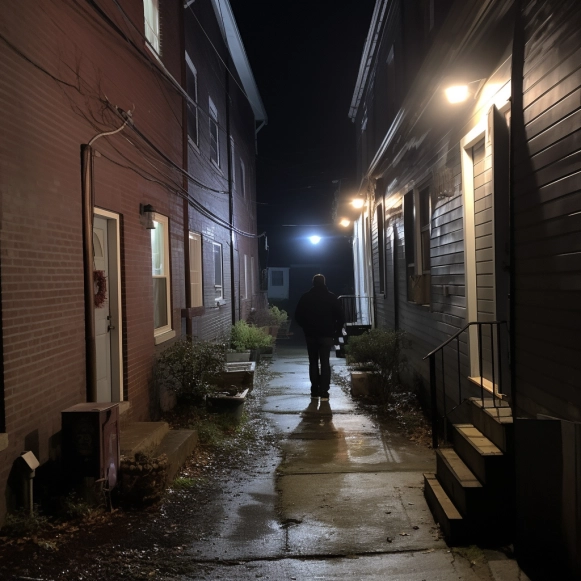Virginia’s ‘Data Center Alley’ residents say an eerie hum is keeping them up at night

- Loudoun County, Virginia, has 175 data centers, which generate hundreds of millions of dollars in tax revenue.
- This year, residents have complained about noise from a newly built data center.
- As counties balance residents’ needs and data-center demand, these tensions may become more common.
Stephanie Brookes and her family were thrilled to relocate to Loudoun County, Virginia, in 2021, where they had purchased a wooded lot.
She began hearing an eerie hum at the beginning of this year, which became louder at night. Brookes thought it sounded like someone was constantly doing lawn work, but she had no idea what it was until neighbors told her it was coming from the data centers that have earned the county the moniker Data Center Alley.
Since the early 2000s, when Loudoun County began allowing data centers to be built, Virginia has seen explosive growth in data centers. The county now has 175 data centers. According to residents BI spoke with and complaints obtained through public records, the noise bothering Brookes and her neighbors comes from a data center known as True North built by Compass Datacenters and completed construction around the beginning of this year. It’s in Leesburg, about 3 miles from Brookes’ house.
Residents in Loudoun County say the noise began this winter and gets louder at night when it’s cooler. The noise became quieter as the temperatures rose in the summer, but it returned as the temperatures dropped in the autumn.
Residents described the noise as sounding like a propeller, a “loud drone hovering above 24/7,” a “big fan,” a construction site, a “low-frequency sound,” an airplane engine, a helicopter, a freight train, a leaf blower, and a lawn mower in interviews and over 40 noise complaints to the county obtained through a public-records request.
“When you hear something like that, it feels like an invasion of your space,” Brookes told me. “It’s an eerie kind of sound, and it makes me concerned about what the other effects are that could be occurring in the environment.”
As more data centers are built across the country, public-health experts anticipate an increase in noise complaints from neighboring communities. Les Blomberg, the nonprofit Noise Pollution Clearinghouse’s founder and executive director, says he’s heard several complaints similar to Loudoun County’s from residents in Virginia and New York, both of which have large data-center sites.
These communities must strike a balance between the residents’ quality of life and the revenue generated by these data centers. Data centers contribute $600 million in tax revenue to Loudoun County’s budget each year, according to Mike Turner, the district supervisor in Ashburn, which is part of the county.
Residents in Loudoun County reported hearing the data center even with their windows closed. Some claimed it caused anxiety and had an impact on their sleep, mental health, and productivity. The noise was so loud that residents several miles away complained.
“We’re getting industrial noise that is disturbing,” Ted Lewis, a county resident, said. “It doesn’t prevent us from going about our daily lives but it does significantly impact the quality of being in our home and outside of our home.”
How the data centers work
Turner stated that while data centers generate a large portion of the county’s tax revenue, the county is “overly dependent” on data-center revenue.
“It puts pressure on management decisions and land-use decisions and budget and everything else,” Turner went on to say. “It’s explosive growth.”
In 2018, the county’s Board of Supervisors narrowly approved Compass’ first data center site in the county. They were contentious due to their location, which is sandwiched between the county’s more residential and rural areas and adjacent to the scenic Goose Creek.
Unlike previous data centers, the new ones use free air cooling, which is designed to use less electricity than most data centers by leveraging lower temperatures.
They don’t make much noise when the temperature is above 70 degrees. As the temperature drops, the data centers become noisier as fans blow in cooler air. Residents reported that the noise peaks at about 50 degrees. Cooling the data-center coils isn’t as important below 35 degrees.
Some residents, including Jeff Mach, began organizing and gathering information about the noise to present to the Loudoun County Board of Supervisors and some nonprofits. “It’s an artificial noise that just drove people crazy,” Mach went on to say. “I’m not making this up. It would be able to pass through walls. It would have a wide range.”
Compass’ vice president of community relations, Katy Hancock, stated that after receiving several complaints from residents, the company measured their noise, which came in below the county’s 55-decibel noise threshold. According to Hancock, the company conducted testing and discovered that the cooling needs of data centers could be met with 20% less fan power.
Compass was talking with local government officials and community members about noise complaints and looking into ways to reduce noise, such as reducing fan operations and collaborating with cooling-equipment manufacturers on new technology, according to Hancock in a statement.
“We have tested noise levels in the community close to our campus and confirmed with the County they are in compliance with permits issued by applicable government agencies,” he said. “Regardless, as a company that’s dedicated to continuous improvement in our operations, any reports of this nature matter to us.”
The noise gets louder again
Mach stated in the fall that the noise isn’t as bothersome, though he can still hear it when he’s indoors. He also stated that residents were not given many details about how Compass dealt with the problem. Even if the noise isn’t technically loud, residents complain about hearing it for extended periods of time, especially at night.
“We get used to neighbors mowing their lawns and us mowing our lawns,” said Noise Pollution Clearinghouse’s Blomberg. “What distinguishes data centers is that the flow of noise is only one way and is continuous. It never stops. There’s no getting around it.”
Brookes stated that the noise makes her not want to spend long periods of time outside. She also does not want her children to be outside for extended periods of time. She claims that it has gotten to the point where she may no longer want to live in Loudoun County.
“If there is noise, it affects how we spend our time.” If we want to sit this one out. “It’s quite unpleasant,” Brookes stated. “We’re picking up on this buzz. It doesn’t happen all the time, but when it does, it lasts longer. Sometimes for an entire day.”
Some residents are also skeptical that the noise problems have been resolved as promised by the company. Lewis stated that there was less noise in the summer, but he recently began hearing the “consistent noise of a fan” at night.
“What we think will happen is as the temperature drops the noise issues will come back and be more of a problem,” said Lewis.
According to public-health experts, prolonged exposure to loud noises (generally above 70 decibels) is associated with an increased risk of cardiovascular disease and hearing loss. While data-center noise is unlikely to reach these levels, people may experience sleep disruption and annoyance over time.
“Even if people do not have cardiovascular disorders, noise disrupts people’s quality of life,” said Arline Bronzaft, a Lehman College professor emerita who has long studied how noise affects people. “Being alive is not enough. Everyone has the right to a decent standard of living. These people are not physically ill yet, but they are depressed and unhappy.”
Plans for future data centers
Beginning this winter, the county intends to work on amending zoning ordinances and implementing design standards for new data centers, including ways to muffle data center noise. Turner estimates that the planning process will take about 15 months. Any zoning changes would only apply to future data centers.
Noise pollution, according to Blomberg of the Noise Pollution Clearinghouse, can be avoided with better planning, such as locating data centers away from residential areas.
“The whole point of planning is to segregate non-compatible uses,” Blomberg told the audience. “Just keep them away from residential areas.” The ones near residential areas must be better acoustically treated.”





